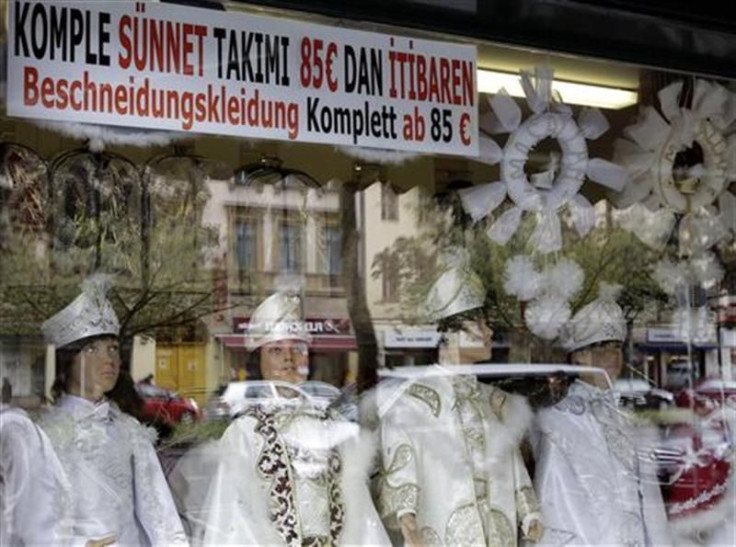Germany Resumes Ritual Circumcisions After Bitter Dispute

Shopkeeper Nevzat Cavan is rushing to meet orders for the white, fur-trimmed costumes worn by Muslim boys for their circumcision, relieved that Berlin's city government has allowed the operations to resume.
For three months, the elaborate suits, capes and oriental slippers languished unsold due to a shock court ruling that raised the possibility of criminal charges being brought against families who had their sons circumcised.
"There were days when we didn't even open the till, but now the phone never stops ringing," Turkish-born Cavan said.
The Cologne court ruling in June outraged Germany's Muslims and Jews, and triggered an anguished national debate, by stating that ritual circumcision of under-aged boys amounted to "bodily harm" and parents should wait for their son to make his own decision.
The ruling applied only to the Cologne area but Jews and Muslims across Germany feared it would create a legal precedent, and doctors fearing prosecution stopped performing operations.
Jewish and Muslim groups branded the court order an attack on their religious freedom and an embarrassed German government - particularly sensitive to charges of intolerance because of the Nazi past - vowed to bring in legislation swiftly to protect ritual circumcisions.
Germany is home to about 4 million Muslims, mostly of Turkish origin, and 120,000 Jews. Chancellor Angela Merkel said if it failed to take action it risked becoming a laughing stock.
Anticipating the new law, Berlin authorities announced last month that families circumcising their sons had no reason to fear prosecution and Cavan began to sell his costumes again.
"Those judges in Cologne had no idea about the ramifications of their ruling," said Cavan, whose own grandson's circumcision had to be postponed.
In his shop 'Kids Elegance' in the mainly ethnic Turkish district of Kreuzberg, Cavan sells suits from 85 euros and brightly colored party dresses and festive clothing for siblings, underlining how important circumcision is to Muslim families and the style with which it is celebrated.
DAMAGING DEBATE
The Justice Ministry has now issued the outlines of the new legislation that will protect a family's right to circumcise their child, provided they have been fully informed about the procedure and use the "most effective pain relief possible".
Completion and approval of the new law, which gives any family the right to have their child circumcised, regardless of religion, may be just weeks away. Some lawmakers are pressing for a vote of conscience freed from party discipline.
Muslim and Jewish groups have cautiously welcomed the outline proposal, but the months of uncertainty and debate that followed the Cologne ruling - which triggered rare joint demonstrations - have shaken the communities.
"This whole row has been very damaging to the integration process," said Cologne doctor Omar Kezze.
Kezze, originally from Aleppo in Syria, is the doctor whose trial sparked the Cologne court ruling. A boy he circumcised was taken to hospital after his wounds continued to bleed and the hospital informed the police and local prosecutors. The court cleared Kezze of all charges but created a legal minefield when it classified circumcision as "bodily harm".
"We have a financial crisis, we have extremists on the left and the right, many, many attacks," Kezze said, speaking in his busy surgery where pictures of his native city adorn the wall.
"There are many things for our prosecutors to fight; they really shouldn't be questioning a tradition dating back to Abraham."
"BODILY INTEGRITY"
He welcomed Germany's new proposal but questioned one aspect, which states that only infants below the age of six months can be circumcised by an individual other than a doctor.
This accommodates the Jewish mohel, an individual specially trained in circumcising, but could prevent Muslims from using similar specialists who are not doctors. In Judaism, boys can be circumcised from eight days old; for Muslims the age of the child varies according to family, country and branch of Islam.
"This difference must be revised in the interest of fair treatment," Nurhan Soykan, general secretary of the German Central Council of Muslims, said in a statement.
Not all in Germany want to allow religious circumcisions. An opinion poll by TNS Emnid shortly after the Cologne ruling found 56 percent opposed to the practice.
Some doctors and children's rights associations submitted a petition in September calling for a two-year moratorium and a round-table of medical, religious and legal experts to study circumcision fully.
"In the clear opinion of experts, the amputation of the foreskin is a grave interference in the bodily integrity of a child," Georg Ehrmann, chairman of the child protection group Deutsche Kinderhilfe, told a news conference.
The dispute has also exposed deeper concerns about the status of religious minorities in Germany.
In an editorial in Germany's Sueddeutsche Zeitung entitled "Do you still want us Jews?", Jewish leader Charlotte Knobloch expressed the fury and despair of her community.
"I seriously ask myself whether Germany still wants us," she wrote. "I ask myself whether these know-it-alls from the world of medicine, law, psychology or politics who rant about 'child torture' or 'trauma' have any idea that, in doing this, they call into question the existence of Germany's tiny Jewish presence."
Ender Cetin, community chairman for Berlin's Sehitlik Mosque, said the debates had been saddening.
"We are yet again thrown into the spotlight and forced to defend ourselves ... This only exacerbates prejudice against us."



























